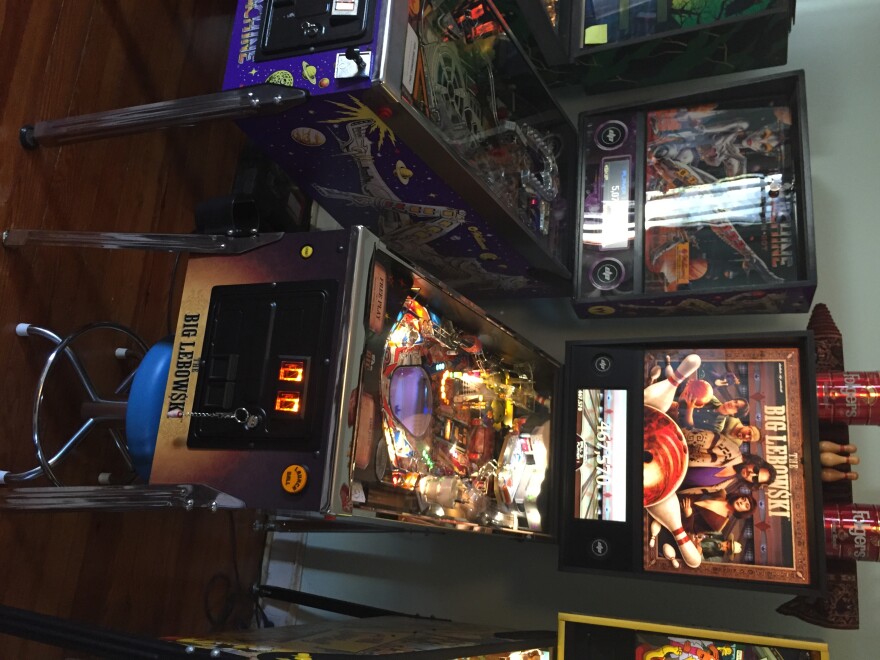Seventeen-year-old Julia Francis was playing pinball with her older brother A.J. Francis at Crabtowne USA in Glen Burnie.
“I’m just trying to prove myself better than this guy,” said Julia, a junior at nearby Old Mill High School.
“Never happens,” her brother, a defensive lineman for the Washington Redskins, said from one pinball machine over. “I’m always the one that comes out on top, even when it comes to pinball. Mainly because I’ve been playing for a decade longer.”
The siblings were surprised to learn about a Maryland law that prohibits minors from playing pinball in public places in certain parts of the state.
The law caught the attention of state Del. Eric Luedtke, who represents part of Montgomery County. Every year Luedtke picks an outdated law to repeal, and this year, the pinball restriction is his target.
“It is illegal in Maryland to play pinball if you’re under 18, and this bill repeals it because that’s ridiculous,” Luedtke told the Senate Budget and Taxation Committee on Wednesday.
The law is linked to the licenses businesses must have in nine Maryland jurisdictions, including Baltimore City and Baltimore and Harford counties, to offer pinball machines for public use.
“Back in the early 1900s when pinball machines were first becoming popular, they were considered gambling, and actually in some places, they were gambling,” Luedtke explained prior to the Senate committee hearing. “You could go into a restaurant and you play the pinball machine, and the bartender would pay you money based on the number of free plays you racked up on a pinball machine.”
But nobody does that anymore, he said, which makes the law pretty pointless.
“In a larger sense, you know, we no longer fear pinball the way that people in the 1940s and 50s did where it had a sort of bad connotation to it,” he said.
There were pinball restrictions in many major cities until the 1970s. In the early 1970s, Los Angeles and Chicago repealed their pinball bans. Then in April 1976, Roger Sharpe, at the time a top pinball player and an editor at GQ Magazine, played a game of pinball before the New York City Council in an effort to get that city’s ban repealed. The goal was to prove that pinball is not a game chance.
“He was able to demonstrate that it was a game of skill, and that he was able to call his different shots that he wanted to make, and once he did that, that was it — pinball was considered to be legal,” said Geoff Danek, the owner of the restaurant Holy Frijoles in Baltimore’s Hampden neighborhood and a competitive pinball player who is ranked 104th in Maryland by the International Flipper Pinball Association.
The New York law legalizing pinball was signed four months later.
But even today laws restricting pinball aren’t unheard of, said Sharpe, who published a book on the history of pinball after his fateful game and co-founded the International Flipper Pinball Association.
Some cities and states restrict the number of machines that can charge money per game, he said. Bars and arcades often get around these rules by charging a flat fee for a certain amount of play time.
Maryland’s law isn’t enforced. There’s no record of a business being fined for letting a minor play pinball, according to the General Assembly’s Department of Legislative Services.
Danek said kids regularly play pinball at his restaurant, Holy Frijoles.
He said that when he got his license for the machines, “nobody really said, oh, hey, you know you can’t have the kids play. I would have thought that they were crazy.”
Holy Frijoles has been closed since last summer because of a fire, but Danek hopes to reopen by early June. He said the restaurant and its pinball machines usually draw people of all ages.
“The coolest thing is just to be able to see parents and kids playing something interactive together that the parents played when maybe they were going to arcades, and now the kids are playing pinball,” Danek explained in his living room while music and sound effects play from his four pinball machines nearby. “They’re like 4 and 5 and we have little step stools so they can get up and play.”




